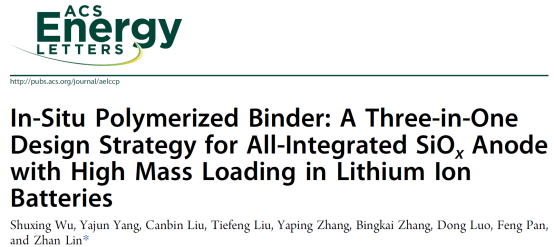
【研究背景】
鉴于硅负极材料低循环寿命的问题,稳定性更好的氧化亚硅(SiOx,0<x<2)成为研究的热点。然而,由于不可忽视的体积膨胀(大约200%),SiOx负极材料同样面临容量快速衰减以及稳定性差等致命缺陷。另外,由于迅速降低的电荷传导率和减弱的电极结构稳定性,在高负载条件下,以上问题更为突出。到目前为止,在高载量的条件下,获得长循环稳定的SiOx负极仍然是一大挑战。
【成果简介】
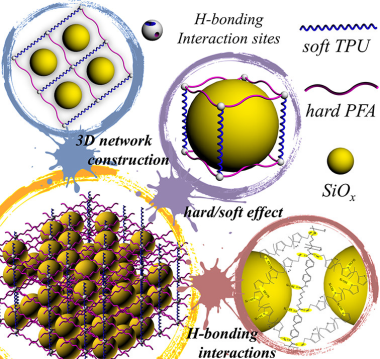
Scheme 1. Schematic illustration of the three-in-one design strategy for binder in SiOxanode with high mass loading: (1) Constructing interpenetrated 3D network, (2) Introducing hard/soft effect to tune mechanical property, and (3) Creating H-bonding interaction.
为应对上述挑战,广东工业大学吴曙星博士以及林展教授采用“三位一体”策略,精准设计、合成出一种普适性复合粘结剂(聚糠醇/热塑性聚氨酯),使得SiOx负极在3mg cm−2的高负载量下,经过100圈循环保持2.4 mAh cm−2的高面积容量。而且,在4.9 mg cm−2超高负载量下SiOx负极仍表现出优异的循环稳定性。为证实粘结剂的普适性,将该粘结剂应用于同样高比能和大体积膨胀的Fe2O3和SnO2负极,在高载量(˃3mg cm−2)的情况下,Fe2O3和SnO2负极的长循环稳定性突出。这项工作为SiOx负极材料的大规模实际应用提供了一种经济、高效的解决方案。相关研究成果以“In-Situ Polymerized Binder: A Three-in-One Design Strategy for All-Integrated SiOx Anode with High Mass Loading in Lithium Ion Batteries”为题发表在能源领域权威期刊ACS Energy LETTERS上。
【图文导读】

Figure 1. Characterizations of 3D network: CLSM images of PFA-TPU/SiOxelectrodes with binders of (a) PFA, (b) TPU, and (c) PFA-TPU. The upper row is the 3D images, and the bottom row is the cross-section images (length: 200 μm).
采用原位聚合法,选用软质聚合物(热塑性聚氨酯,TPU)和硬质聚合物(聚糠醇,PFA),经草酸催化发生原位聚合,构建三维网络复合粘结剂。三维网络结构的粘结剂有利于电极在循环过程中电荷传输以及保持电极结构完整性。为了证明三维网络结构,对电极进行激光共聚焦显微镜测试,发现PFA和TPU相互均匀连续地相互渗透,形成三维网络结构包裹在SiOx颗粒上。
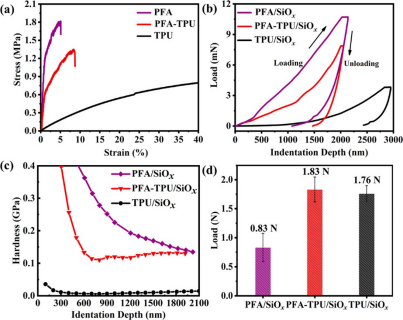
Figure 2. Characterizations of hard/soft effect: (a) strain−stress curve of the polymers and (b) load-indentation depth curve, (c) hardness, and (d) peeling test results of the electrodes.
该粘结剂的软质弹性组分(TPU)可以缓冲SiOx的体积变化,保证SiOx在循环过程中的电荷传输,硬质塑性组分(PFA)可构建
SiOx电极体系的稳定框架结构,保证电极的整体稳定性。应力-应变曲线和纳米压痕测试都证明复合粘结剂的居于两个单组分之间;剥离测试证明复合粘结剂与SiOx活性材料和集流体间具有更强的附着力。
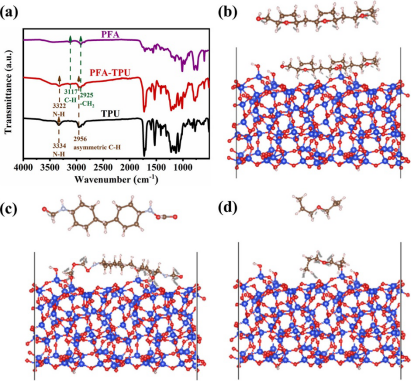
Figure 3. Characterizations of H-bonding interactions: (a) FIIR spectra of PFA, PFA-TPU, and TPU. Adsorption configuration for (b) PFA, (c) TPU-m, and (d) TPU-n over the amorphous SiOxsurface. White, brown, red, dark blue, and light blue spheres represent H, C, O, Si, and N atoms, respectively.
PFA与TPU复合,两者形成强烈的氢键相互作用,增强粘结剂机械强度,提高电极稳定性。红外光谱证明了PFA与TPU之间的氢键作用,复合粘结剂的N-H基团相对于单组分TPU发生了较大的偏移(12 cm-1)。另外,密度泛函理论(DFT)计算证明了粘结剂与SiOx间的氢键作用。非晶SiOx的氧原子与周围的氢原子相互作用,其吸附能分别为−1.12 eV (PFA)、−0.93 eV (TPU-m)和−0.23 eV (TPU-n),证明了PFA-TPU粘结剂与SiOx之间的自发氢键作用。
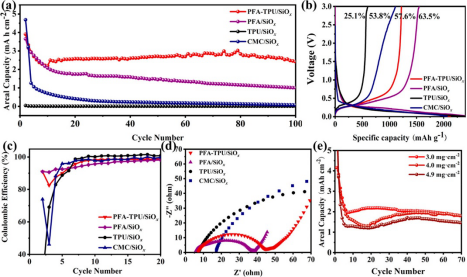
Figure 4. Electrochemical performance of SiOx electrode with PFA-TPU binders under high mass loading (>3.0 mg cm–2). (a) Cycling performance at 100 mA g–1. (b) First charge–discharge curves. (c) Coulombic efficiencies from 2 to 20 cycles. (d) EIS measurements. (e) Cycling performance of the PFA-TPU/SiOx electrode at different mass loadings at 100 mA g–1.
PFA-TPU/SiOx电极具有优异的循环性能,在高负载条件下(>3.0 mg cm–2),经过100次循环后,电极的面积容量保持在2.4 mAh cm-2,在4.9 mg cm-2超高负载量下,电池同样保持良好的稳定性。PFA-TPU/SiOx电极首次库伦效率虽然较低(63.5%),但在5个循环内迅速上升,之后表现平稳,验证了其在后续循环中优越的长循环稳定性(图4c)。值得一提的是,PFA-TPU/SiOx电极相比于PFA/SiOx电极具有更低的首次库伦效率和更大的界面电阻,然而,PFA-TPU/SiOx电极仍然表现出更好的循环性能。因此,证明复合粘结剂的设计合理性。
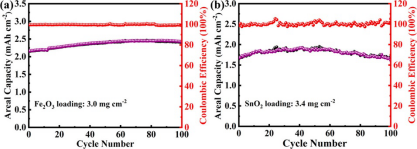
Figure 5. Electrochemical performances of metal oxide anodes with high mass loading after activation treatment. (a) Cycle retention of the PFA-TPU/Fe2O3electrode with Fe2O3loading of 3.0 mg cm–2at 200 mA g–1. (b) Cycle retention of the PFA-TPU/SnO2electrode with SnO2loading of 3.4 mg cm–2at 100 mA g–1.
为证明粘结剂的普适性,将粘结剂分别应用于具有高比容量和大体积膨胀的商用Fe2O3和SnO2负极材料。Fe2O3质量负载为3.0 mg cm-2时, PFA-TPU/Fe2O3电极在激活后,经过100圈后面积容量稳定在2.4 mAh cm-2。在活性物质负载为3.4 mg cm-2的条件下,PFA-TPU/SnO2电极经过100圈后面积容量稳定在1.7mAh cm-2。
【总结】
该研究提出“三位一体”的策略,精准设计、合成新型复合粘结剂,成功实现了在高负载条件下,SiOx负极的长循环稳定性,从而促进SiOx负极的商业化应用。
[参考链接]
Shuxing Wu, Yajun Yang, Canbin Liu, Tiefeng Liu, Yaping Zhang, Bingkai Zhang, Dong Luo, Feng Pan, and Zhan Lin*. In-Situ Polymerized Binder: A Three-in-One Design Strategy for All-Integrated SiOxAnode with High Mass Loading in Lithium Ion Batteries.
ACS Energy Lett.2021, 6, 290-297.
DOI:10.1021/acsenergylett.0c02342
原文链接:
https://doi.org/10.1021/acsenergylett.0c02342
